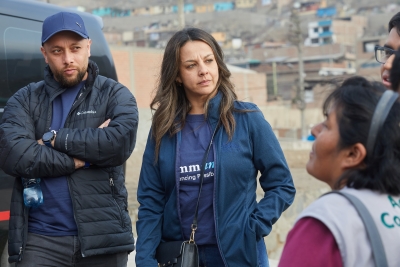
Imagine being offered the chance to spend a week in another country meeting new people and helping a nonprofit health care organization – all as part of your day job.
That’s the opportunity Boston Scientific gave 12 employees last year as part of its pilot Social Change Champions program. The mission: to help health care organizations around the world to solve the operational obstacles they face through the transfer of critical skills, rather than through one-off financial or product donations.
“The Social Change Champions program is very much aligned with our focus on environmental, social and governance (ESG); our caring value; and the work we do in the health equity space,” says Wendy Carruthers, executive vice president, Human Resources. “It's a way we can make an impact in a more sustainable way while providing leadership opportunities for our employees.”
Through its Signature Health Grant program, Boston Scientific offers financial support to boost health care communities in low- and middle-income countries around the world. For the first Social Change Champions program, the company decided to work with a recent Signature Health Grant recipient called Socios en Salud (SES). SES provides health care as well as access to food, transportation, housing and more to people living in poverty.
The mission: to get more patients in Peru the care they need
Twelve North and Latin American employees with experience in fields such as marketing, design, data analysis and public health were chosen to travel to Lima, Peru, for a week. There, they met with SES staff to understand the biggest challenges they were facing as an organization. (Future programs will aim to include employees across Boston Scientific sites globally.)
Ultimately, the Social Change Champions broke into two working groups. The first would help define a profitable growth strategy for SES so they could attract more patients to its healthcare clinic, lab and pharmacy and potentially take on bigger projects to help the local community.
“Their team works very hard every day getting help to patients, which doesn't allow them to have much time to actually do administrative work,” says Analyn Esquivel, a senior Global Business Services Delivery Manager at Boston Scientific.
The second group tackled the issue of how to get crucial HPV testing to people who couldn’t come to the clinic to be screened by obstetricians – a major concern given the high incidence of cervical cancer in Peru.
“The barriers are immense for some of these women to get to a clinic to get tested,” says Cole Gibas, a senior R&D manager at Boston Scientific. The SES clinic is down a steep mountain from local houses, he notes, and many people cannot afford a vehicle to help them make the trip.
After departing Peru, the Social Change Champions met virtually over nine weeks to develop action plans SES could execute once the program was over. Ultimately, they were able to recommend project management strategies and delineate employees’ job roles more clearly to eliminate time-consuming inefficiencies within the clinic, lab and pharmacy and boost revenue as a result.
They also created FAQs in English and Spanish to educate women on the importance of cervical cancer screening and worked with community health agents beyond the walls of SES to administer these tests to women closer to home.
“Enabling them to go into the community with HPV tests really expands how many patients can benefit,” says Gibas.
Helping the community – and learning important lessons
While the program just concluded at the end of 2023, Santiago Palomino, M.D., head of the Non-Communicable Diseases and Cancer program at SES, has already felt the impact of the Social Change Champions.
“They were a tremendous group,” he says. “My program now has tools to support a better process of detecting cervical cancer. But I’ve also learned as a physician and a program manager how to promote change and be clearer about the objectives I want.”
The Boston Scientific employees who were part of the pilot program were significantly affected by their experience, too.
“I cannot tell you enough how many lessons I learned, including compassion,” says Esquivel. “When we first visited SES, it was shocking to many of us to understand the conditions in which people lived. It was a reality slap. But we kept on going, working together. I’m a better person because of this program.”
Gibas concurs. “We were all thrown into a very challenging situation,” he says. “We had to start from scratch and in the end, we needed every single perspective. We relied on that diversity of thought and opinion and it all worked out in the end.”
Learn more about how Boston Scientific is creating sustainable change around the world through our ESG strategy.